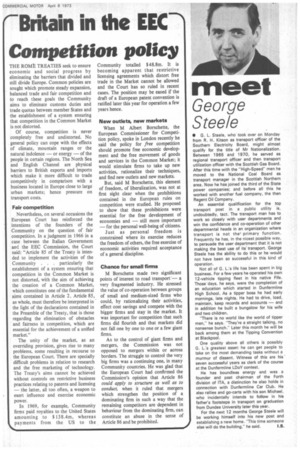'Britain in the EECTh
Page 43

If you've noticed an error in this article please click here to report it so we can fix it.
Competition policy
THE ROME TREATIES seek to ensure economic and social progress by eliminating the barriers that divided and still divide Europe. Common policies are sought which promote steady expansion, balanced trade and fair competition and to reach these goals the Community aims to eliminate customs duties and trade quotas between member States and the establishment of a system ensuring that competition in the Common Market is not distorted.
Of course, competition is never completely free and undistorted. No general policy can cope with the effects of climate, mountain ranges or the natural indolence — or energy — of the people in certain regions. The North Sea and English Channel are physical barriers to British exports and imports which make it more difficult to trade competitively in comparison with a business located in Europe close to large urban markets; hence pressure on transport costs.
Fair competition
Nevertheless, on several occasions the European Court has reinforced the intentions of the founders of the Community on the question of fair competition. In a judgment in 1966 in a case between the Italian Government and the EEC Commission, the Court said: "Article 85 of the Treaty is intended to implement the activities of the Community . . . particularly the establishment of a system ensuring that competition in the Common Market is not distorted, with the aim of achieving the creation of a Common Market, which constitutes one of the fundamental aims contained in Article 2. Article 85, as whole, must therefore be interpreted in the light of the declarations contained in the Preamble of the Treaty, that is those regarding the elimination of obstacles and fairness in competition, which are essential for the achievement of a unified market.
The unity of the market, as an overriding provision, gives rise to many problems. some resulting in recourse to the European Court. There are specially difficult problems in relation to research and the free marketing of technology. The Treaty's aims cannot be achieved without controls on restrictive business practices relating to patents and licensing — the latter, all too often, a weapon to exert influence and exercise economic power.
In 1969, for example, Community firms paid royalties to the United States amounting to S 138.4m, whereas \payments from the US to the
Community totalled 548.8m. It is becoming apparent that restrictive licensing agreements which distort free trade in the Market cannot be allowed and the Court has so ruled in recent cases. The position may be eased if the draft of a European patent convention is ratified later this year for operation a few years hence.
New outlets, new markets When M Albert Borschette, the European Commissioner for Competition policy, spoke in London recently he said the policy for free competition should promote free economic development and the free movement of goods and services in the Common Market; it would stimulate firms to take up new activities, rationalize their techniques, and find new outlets and new markets.
But, said M Borschette, this element of freedom, of liberalization, was not at first sight clear when the prohibitions contained in the European rules on competition were studied. He proposed to show that these prohibitions were essential for the free development of economies and — still more important — for the personal well-being of citizens.
Just as personal freedom is constrained where its exercise reduces the freedom of others, the free exercise of economic activities required acceptance of a general discipline.
Chance for small firms M Borschette made two significant points of interest to road transport — a very fragmented industry. He stressed the value of co-operation between groups of small and medium-sized firms who could, by rationalizing their activities, effect cost savings and compete with the bigger firms and stay in the market. It was important for competition that such firms did flourish and that markets did not fall one by one to one or a few giant firms.
As to the control of giant firms and mergers, the Commission was not opposed to mergers within or across borders. The struggle to control the very big firms was a continuing one, in many Community countries. He was glad that the European Court had confirmed the Commission's opinion that Article 86 could apply to structure as well as to conduct, when it ruled that mergers which strengthen the position of a dominating firm in such a way that the remaining competitors are dependent in behaviour from the dominating firm, can constitute an abuse in the sense of Article 86 and be prohibited.












































































































